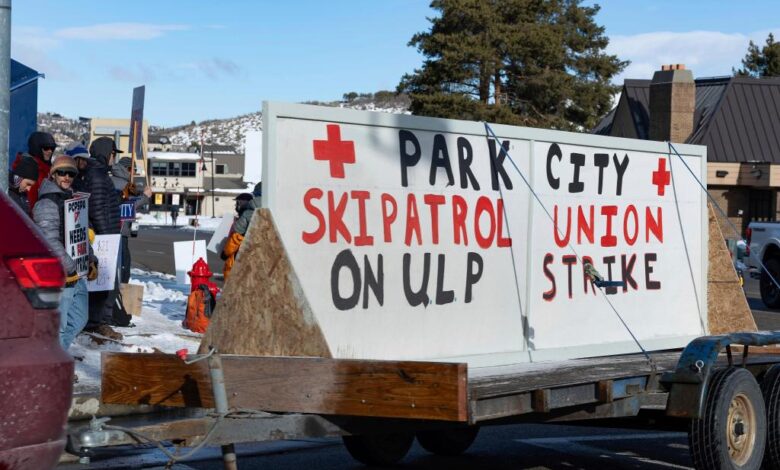Vail Resorts ousts CEO Kirsten Lynch

Following a period of declining stock prices and various challenges to the company’s reputation, including a strike by ski patrollers at one of its major mountains, Vail Resorts announced on Tuesday that CEO Kirsten Lynch would be stepping down after leading the company for three and a half years.
She was succeeded by Rob Katz, who had previously served as CEO for 16 years before Lynch took over.
“As Vail Resorts continues to execute its strategic priorities and transformational initiatives, the board believes now is the right time for this leadership transition,” said Bruce Sewell, the lead independent director of the board, in a news release. “Rob has a proven track record of driving innovation and delivering consistent performance at Vail Resorts, and has been instrumental in shaping the company’s operations and long-term strategy for over the past three decades.”
Wall Street analyst Patrick Scholes, who specializes in the travel industry for Truist Securities, pointed to the poor stock performance and negative perception of the company among skiers as reasons for Lynch’s departure.
“The most glaring issue is the underperformance of the stock during her tenure,” Scholes explained. “You can simply look at Vail Resorts’ stock chart and see a significant decline over that period — especially when compared to the overall market performance.
“Each year, they would provide financial guidance to investors at the start of the season, and for the past three years, they have fallen short,” he added. “As a well-compensated CEO, you only have so many opportunities to miss your financial targets.”
Vail Resorts’ shares (NYSE: MTN) were trading around $355 per share just before Lynch became CEO in November 2021. By the time of her departure, the shares had closed at $151.50 on Tuesday, marking a 57% decrease. The stock price had dropped to as low as $129.85 on April 8, reaching a level not seen since March 2016. Following Lynch’s exit, investors responded positively by pushing the share price up by more than 11%.
One of the incidents that tarnished the company’s reputation was a 12-day strike by ski patrollers at Park City Mountain Resort in Utah during the Christmas-New Year’s holiday season of 2024-25, Scholes noted.
“That was a significant blow to the company,” Scholes remarked. “Ultimately, the head of the company bears the responsibility. It was a negative situation for Vail. From my discussions with investors over the past year, it was incredibly frustrating. I believe the board had to take action.”
Lynch’s tenure faced challenges from the start in the winter of 2021-22. The company reduced prices for the Epic Pass, resulting in a surge in pass sales, but several resorts operated under-staffed during the season. This was partly due to the omicron COVID variant and high housing costs in mountain communities, leading to backlash on social media and in national news reports citing issues like long lift lines, unplowed parking lots, limited terrain, and disgruntled, overworked staff.
Since then, the company has been subject to frequent negative attention on social media platforms.
“The negative perception within the skiing community — some warranted, some perhaps not — had spiraled out of control for the company,” Scholes observed. “It had lost the narrative of providing a high-quality experience.”
In a letter to employees, Katz praised Lynch as a “transformative” leader and expressed gratitude for her 14 years of service with the company.
“I appreciate her leadership during these challenging times that our company has faced as we navigated through post-pandemic uncertainties,” Katz wrote. “While the board felt that a change was necessary at this time, I, along with the entire board, am immensely grateful for Kirsten’s achievements and contributions.”
Katz had previously led the company from 2006 to 2021.
“My primary objective in returning as CEO,” Katz stated, “is to ensure that we align with all stakeholders to provide an unparalleled experience for our employees and guests while driving financial success for our company, enabling us to continue investing in the work we are passionate about.”
According to a resignation agreement signed by Vail Resorts’ Chief Human Resources Officer Lynanne Kunkel and Lynch, Lynch officially resigned effective May 22. She will remain with the company as a strategic advisor until September 2025, receiving full compensation and health benefits.
Lynch will be granted a one-time lump sum payment of $2.25 million, equivalent to two years of her base salary. She will also be eligible for a pro-rated bonus for the fiscal year 2025, ending on July 31, as well as the vesting of her outstanding stock options.
As of last summer, Lynch had $5.2 million in stock awards that would vest upon her departure. This amount is in addition to the $2.2 million severance payment.
Contributions to this article were made by Denver Post staff writer Aldo Svaldi.
Subscribe to our weekly newsletter, The Adventurist, to receive outdoor news directly to your inbox.
Originally Published:





